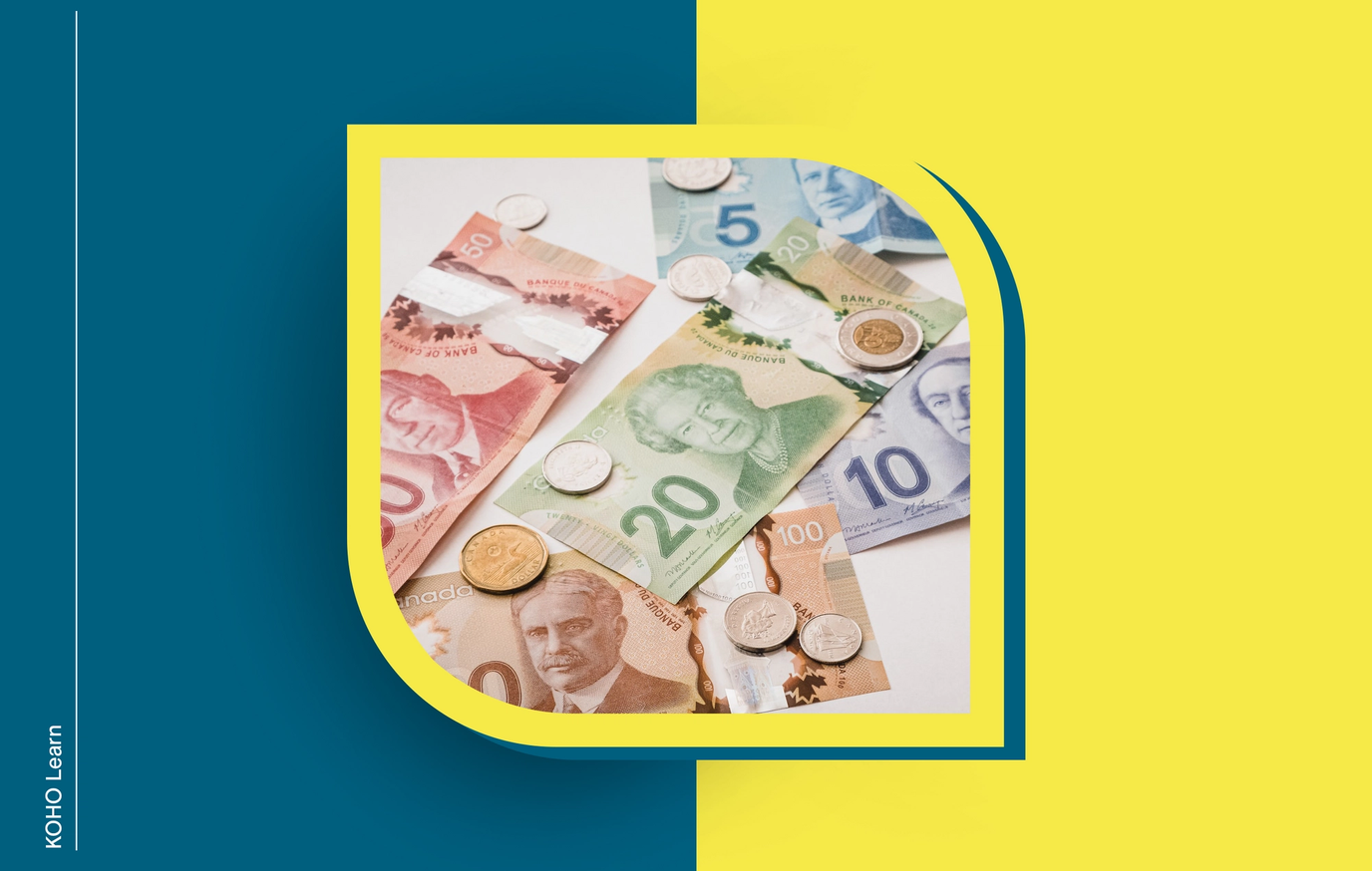Looking to make your money work harder? High Interest Savings Accounts (HISAs) in Canada might be your answer. These financial powerhouses can offer interest rates up to 10 times higher than what you'd find in the standard savings account that came bundled with your chequing account. Imagine earning meaningful returns on your emergency fund or vacation savings without taking on investment risk!
While the elevated interest rates are certainly appealing, it's worth understanding what you're signing up for. HISAs often come with specific terms like minimum balance requirements, transaction limitations, or slightly longer processing times for withdrawals. Some Canadian financial institutions market similar products as "money market accounts" or simply "high yield savings accounts," but they all share the common goal of helping your money grow more efficiently than traditional options.
1. KOHO
Looking to make your money work smarter in 2025? Among Canada's competitive savings landscape, KOHO's high interest savings account stand out by offering one of the country's most attractive interest rates: up to 4% on your entire balance.
Unlike traditional savings accounts that restrict access or charge hidden fees, this approach is refreshingly straightforward. Your entire balance earns interest – whether it's in your Spendable funds, RoundUps, or dedicated Savings Goals. This isn't just marketing talk; the 4% is a genuine annual rate calculated daily and deposited into your account monthly, maximizing your compound returns.
What makes KOHO particularly appealing is the flexibility. While many high interest accounts lock away your money or penalize withdrawals, you can access your funds and interest earnings whenever you need them. It's designed for real people who occasionally need their savings for actual life expenses.
2. Scotiabank's MomentumPLUS Savings Account
This account offers an option for Canadians looking to maximize their savings in 2025. With a promotional rate of up to 5.00% for the first 3 months, it's designed to reward those who can commit to longer-term savings goals.
You can save for multiple financial objectives simultaneously within a single account, eliminating the need to juggle several banking products. The account operates on a straightforward premise: the longer you keep your money saved, the higher your interest rate climbs.
3. BMO Savings Amplifier Account
This account has no minimum deposit required to get started, making it perfect for savers at any stage of their financial journey. Your interest is calculated daily based on your closing balance and conveniently paid out monthly, helping your money grow steadily.
One handy feature is the unlimited free e-transfers between your BMO accounts, giving you flexibility to move your funds around as needed without incurring fees. However, it's worth noting that certain transactions will trigger a $5 fee, including pre-authorized debits, debit purchases (both in-store and online), ATM withdrawals, and transfers made with the help of an associate.
What is a High Interest Savings Account (HISA) in Canada?
Let's face it - with inflation taking a bite out of our purchasing power, parking your cash in a regular savings account just doesn't cut it anymore. That's where high interest savings accounts come in. These accounts do exactly what the name suggests: they offer noticeably better interest rates than standard savings options, helping your money actually grow while it sits safely in your account.
How Do HISAs Work?
The beauty of a high-interest savings account lies in its simplicity. The interest applies to your entire balance (not just portions of it), and most institutions calculate that interest daily but deposit it into your account monthly. This means your money starts working for you right away, and you benefit from compound interest over time.
Currently, most Canadian HISAs offer rates between 1-2.5%, though some (like KOHO!) provide rates around 4% - a serious upgrade from the 0.01% you might get with a traditional bank's regular savings account.
Why Choose a HISA Over Other Investments?
While stocks or ETFs might deliver higher returns over the long haul, they come with volatility and risk. HISAs offer that perfect middle ground: better returns than regular savings accounts with none of the market risk. Your principal is protected, and your returns are guaranteed. Plus, you'll typically have easy access to your money when you need it.
How To Choose a High Interest Savings Account in Canada?
Finding the right home for your hard-earned money doesn't have to be complicated, even with all the savings options available in Canada these days. When you're looking at high interest accounts, it's helpful to know that they come in a few distinct flavors to match your specific needs.
Understanding HISAs vs. TFSAs
While they might sound similar, high interest savings accounts and Tax-Free Savings Accounts (TFSAs) serve different purposes in your financial toolkit:
High Interest Savings Account (HISA):
A straightforward account where your money earns a higher interest rate than regular checking accounts
Interest earned is taxable income
Ideal for emergency funds and short-term savings goals
No contribution limits or withdrawal restrictions
Tax-Free Savings Account (TFSA):
A registered account where any growth (interest, dividends, capital gains) is completely tax-free
Can hold various investments including cash, stocks, ETFs, mutual funds, and more
Has annual contribution limits ($7,000 for 2025)
More versatile, allowing both saving and investing options
Finding Your Perfect Match
The best part? Most financial institutions across Canada offer these options, so you can shop around for the rates and features that align with your financial goals. Ready to start earning more on your savings? Check out KOHO's competitive high-interest accounts and see how much more your money could be making for you today!
Who Benefits Most from High Interest Savings Accounts?
While everyone likes earning more on their money, high interest savings accounts (HISAs) are particularly valuable for certain financial situations. If you're looking to organize your finances while giving your savings a meaningful boost, a HISA might be exactly what you need.
Perfect for Short-Term Goals
Planning a dream vacation for next summer? Saving up for that wedding on the horizon? Or maybe you're assembling a down payment for your first home? High yield savings accounts shine brightest for these kinds of short-term goals.
Essential for Emergency Funds
Financial experts consistently recommend having 3-6 months of expenses set aside for unexpected situations. A high yield savings account is the ideal home for this emergency fund - your money remains easily accessible while still earning meaningful returns.
Financial Organization Made Simple
Beyond just the interest benefits, these accounts help create structure in your financial life. They allow you to clearly separate your spending money from your savings, making it easier to track progress toward specific goals without accidentally dipping into funds meant for other purposes.
What to Look For in a High Interest Savings Account (HISA)
Interest Rate
Let's be real—this is probably why you're considering a HISA in the first place! Compare rates across different institutions, but watch out for "teaser" or promotional rates. These flashy numbers might look impressive at first glance, but often drop significantly after 3-6 months.
Pro tip: A steady, competitive rate might serve you better in the long run than a temporary high that falls back to earth.
Minimum Deposit Requirements
Some institutions require an initial deposit to open your account—ranging from as little as $25 to much higher amounts. Make sure this aligns with how much you're ready to save right now.
Service Fees and Transaction Limits
While most HISAs don't charge monthly maintenance fees, many have fees for:
Withdrawals beyond a monthly limit
Transfers to other institutions
Falling below minimum balance requirements
Read the fine print to understand what actions might cost you, potentially eating into your interest earnings.
Reputation and Security
Choose an institution that's backed by deposit insurance through the Canada Deposit Insurance Corporation (CDIC) for banks or provincial deposit insurance for credit unions. This protects your savings (up to coverage limits) if the financial institution fails.
Accessibility
Consider how you'll need to access your money:
Do you prefer in-person banking or are you comfortable with online-only options?
How quickly can you withdraw funds when needed?
Does the account connect easily to your existing banking setup?
Tips to Maximize Your Savings
While a high-interest savings account already gives your money a boost, here are some smart strategies to take your savings game to the next level:
Put Your Savings on Autopilot
Setting up automatic transfers is like having a personal savings assistant. Choose an amount—even $25 or $50 per payday—to move automatically from your checking to savings account. You'll be surprised how quickly these regular contributions add up, and since it happens automatically, you won't be tempted to spend that money elsewhere. Out of sight, out of mind!
Don't Sleep on Promo Rates
Financial institutions often roll out special rates to attract new customers. These promotional offers can significantly boost your returns, even if just for a few months. Before jumping on a flashy rate, do a quick calculation to see if the promotional earnings actually beat what you'd make with a consistent, slightly lower rate elsewhere. Sometimes a steady 4% beats a 5% that drops to 2% after 90 days.
Stay in the Interest Rate Loop
Interest rates are constantly on the move. They shift based on economic conditions and central bank decisions. Make it a habit to check your rate against competitors every few months. If you spot a significantly better deal elsewhere, don't hesitate to move your money.

About the author
Sam Boyer spends, invests, budgets, and writes. He enjoys writing about things he wishes he’d learned earlier — like spending, investing, and budgeting. A journalist originally from New Zealand, Sam has written extensively about consumer affairs, insurance, travel, health, and crime.
Read more about this author